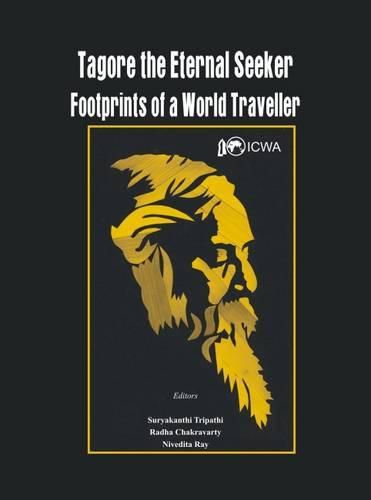Readings Newsletter
Become a Readings Member to make your shopping experience even easier.
Sign in or sign up for free!
You’re not far away from qualifying for FREE standard shipping within Australia
You’ve qualified for FREE standard shipping within Australia
The cart is loading…






This title is printed to order. This book may have been self-published. If so, we cannot guarantee the quality of the content. In the main most books will have gone through the editing process however some may not. We therefore suggest that you be aware of this before ordering this book. If in doubt check either the author or publisher’s details as we are unable to accept any returns unless they are faulty. Please contact us if you have any questions.
Rabindranath Tagore (1861-1941) was a towering figure in India’s intellectual and cultural landscape. He was not only a writer, artist, music composer and a philosopher but also a world traveller. He travelled to more than 34 countries in his lifetime and these travels left a deep impact on him. According to Humayun Kabir, travel not only broadened his selfhood, it also contributed to his philosophy of internationalism and the development of his institution, Visva-Bharati. He believed that inclusivism and synergic interaction between cultures would propel the world towards harmony and global fellowship. Tagore was a curious and keen observer of socio-political life in the numerous countries that he visited. He made an immense contribution to the making of modern India and left a deep imprint on leaders like Pandit Jawaharlal Nehru and Sarojini Naidu. This book explores Tagore’s travels, and assesses the extent to which he was influenced by his visits and the deep impression he left on the countries he visited. Here, experts from India and several countries to which Tagore had travelled offer an array of perspectives on Tagore’s thoughts and vision. They examine how his journeys contributed to his philosophy of internationalism, universalism, humanism, spiritual unity and the religion of man. The volume also illuminates the influence of Tagore’s ideas upon the evolution and continuing ethos of Indian foreign policy.
$9.00 standard shipping within Australia
FREE standard shipping within Australia for orders over $100.00
Express & International shipping calculated at checkout
This title is printed to order. This book may have been self-published. If so, we cannot guarantee the quality of the content. In the main most books will have gone through the editing process however some may not. We therefore suggest that you be aware of this before ordering this book. If in doubt check either the author or publisher’s details as we are unable to accept any returns unless they are faulty. Please contact us if you have any questions.
Rabindranath Tagore (1861-1941) was a towering figure in India’s intellectual and cultural landscape. He was not only a writer, artist, music composer and a philosopher but also a world traveller. He travelled to more than 34 countries in his lifetime and these travels left a deep impact on him. According to Humayun Kabir, travel not only broadened his selfhood, it also contributed to his philosophy of internationalism and the development of his institution, Visva-Bharati. He believed that inclusivism and synergic interaction between cultures would propel the world towards harmony and global fellowship. Tagore was a curious and keen observer of socio-political life in the numerous countries that he visited. He made an immense contribution to the making of modern India and left a deep imprint on leaders like Pandit Jawaharlal Nehru and Sarojini Naidu. This book explores Tagore’s travels, and assesses the extent to which he was influenced by his visits and the deep impression he left on the countries he visited. Here, experts from India and several countries to which Tagore had travelled offer an array of perspectives on Tagore’s thoughts and vision. They examine how his journeys contributed to his philosophy of internationalism, universalism, humanism, spiritual unity and the religion of man. The volume also illuminates the influence of Tagore’s ideas upon the evolution and continuing ethos of Indian foreign policy.